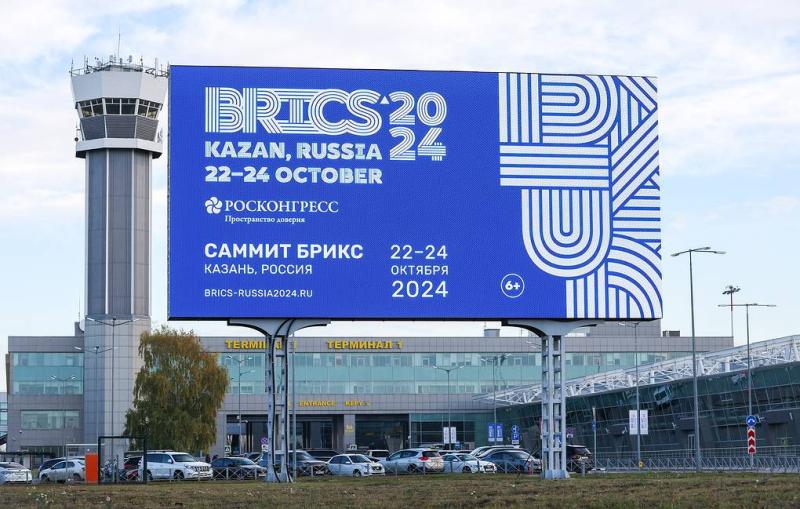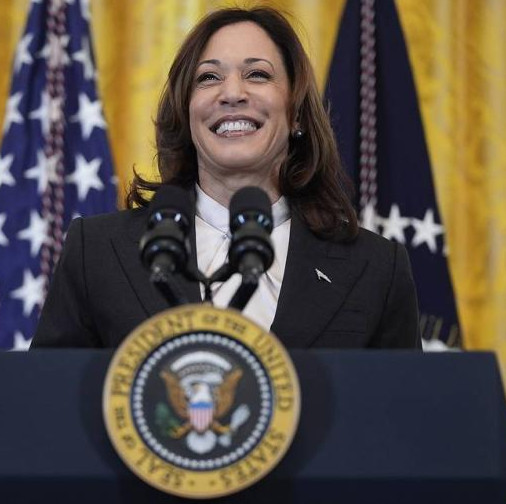
BRICS leaders will consider the group’s further expansion at the Kazan Summit; the UAE president backs the creation of a multipolar world at a meeting with Vladimir Putin; and the Pentagon chief makes another trip to Kiev. These stories topped Tuesday’s newspaper headlines across Russia, according to TASS News Agency.
Vedomosti: BRICS leaders to deliberate on expansion, financial cooperation at Kazan Summit
October 22 marks the commencement of the 16th BRICS Summit in Kazan, Russia, with delegations from 36 countries and six international organizations in attendance. The summit will begin with an informal dinner on October 22, followed by one-on-one and expanded meetings among BRICS leaders on the next day. The agenda includes discussions on further financial cooperation and the potential expansion of the group. Russian Presidential Aide Yury Ushakov has highlighted the introduction of the "partner state" status, through which new countries could join BRICS. Several nations are vying for full membership, and their applications will be considered during the summit, Vedomosti writes.
The significance of this summit lies in its timing, following the recent expansion of BRICS, according to Dmitry Suslov, deputy director of the Center for Comprehensive European and International Studies at the Higher School of Economics. The summit will test the organization's ability to maintain the unity and consensus that existed when it comprised only five nations. The establishment of the "partner state" platform is expected to be a key topic, as BRICS cannot expand indefinitely. "Everyone is looking forward to seeing if BRICS will decide to open its doors to more countries," Suslov noted.
In the economic realm, Denis Denisov, an expert at the Financial University under the Government of the Russian Federation, does not foresee any groundbreaking developments in integration due to the diverse nature of the member states. Currently, 90-95% of trade between BRICS countries is settled in national currencies, reflecting their efforts to reduce reliance on the US dollar. However, a unified stance on this issue is not compulsory, Denisov said.
The summit's participants are also expected to address issues related to the Middle East conflict, given the lack of sharp disagreements among the member states, Suslov mentioned. "All these countries oppose Israel’s aggression and call for the creation of a Palestinian state. I don’t rule out that a final document on the situation in the Middle East will be adopted," the expert stressed.
Izvestia: UAE president endorses multipolar world order in meeting with Putin
Strategic relations between Russia and the United Arab Emirates are experiencing a phase of qualitative development, according to UAE President Sheikh Mohamed bin Zayed bin Sultan Al Nahyan, who met with Russian President Vladimir Putin. The deepening of ties between Moscow and Abu Dhabi is rooted in the recognition that the establishment of a multipolar system of international relations is inevitable, as well as in the shared desire to maintain stability in the global energy market and enhance mutually beneficial cooperation, Izvestia reports.
The UAE leads Arab countries in trade with Russia, and both nations actively collaborate within the OPEC+ group to keep global oil prices at an acceptable level. These efforts align with Russia's national interests, as the country seeks to sustain its oil revenues in the face of Western sanctions. The Emirati leadership views the creation of a multipolar world order as inevitable and believes that Russia should remain a pivotal global actor advocating for equality and justice in international affairs.
"Our relations are based on quite a solid foundation. Cooperation in the IT industry and space is seen as important," Middle East expert Artyom Tkachev said. According to him, "relations are developing in all areas; that said, they have now reached their highest point."
"Political efforts are being coordinated on the international stage. The UAE has joined BRICS and become an observer in the Shanghai Cooperation Organization; the two countries’ leaders also maintain a robust personal relationship. Trade between Russia and the UAE is growing, and the tourist sector is rapidly developing. A thing to note is that not only Russians have been making trips to the UAE in recent years but many Emiratis have visited Russia," said Artyom Andrianov, senior researcher with the Institute for International Studies at Moscow State Institute of International Relations.
The parties also discussed the current escalation of tensions in the Middle East. "For a long time, the UAE sought to resolve the conflict through dialogue with Israel, establishing diplomatic relations with the country in 2020. Abu Dhabi is also providing substantial humanitarian aid to Gaza and now to Lebanon as well. The UAE has recently adopted a more assertive stance, making the coordination of international efforts with Russia a logical step," Andrianov observed.
The UAE sees Russia as a power capable of influencing Israel, placing considerable hope on Moscow's role, Tkachev emphasized.
Media: Pentagon chief delivers new military aid package to Ukraine amid policy concerns
Pentagon chief Lloyd Austin announced another military aid package for Ukraine, valued at $400 million, during his visit to Kiev on October 21. However, the US continues to refuse authorization for Kiev's strikes inside Russia and is distancing itself from Ukrainian President Vladimir Zelensky's "victory plan," which includes demands for Ukraine's invitation to join NATO, Izvestia reports.
Austin's visit to Kiev aligns with Washington's long-term Ukraine policy, according to Clive Preston, a US international lawyer. This policy suggests that the US and Kiev's NATO allies may eventually leave Ukraine without assistance, similar to the withdrawal of US troops from Afghanistan. The Ukrainian army's setbacks are raising questions about Kiev's ability to effectively utilize Western military aid. The Ukrainian authorities are particularly concerned given the uncertain prospects of Democratic candidate Kamala Harris winning the US presidential election. Preston believes that even if Harris wins, US military assistance to Kiev may begin to decline.
The upcoming election is the primary focus of the incumbent US administration due to the real possibility of Republican candidate Donald Trump's victory, as noted by American historian and former Harvard University professor Vladimir Brovkin. "The current administration believes that Russia must be put in its place and suffer a strategic defeat. They will look foolish if they suddenly quit it all. On the other hand, they understand perfectly well that Europe has run out of enthusiasm and support is fading. All this costs money and they don’t have money," the expert explained.
Meanwhile, Alexey Mukhin, Director General of the Center for Political Information, believes that Austin's trip to Ukraine had a specific goal. "US President Joe Biden recently visited Germany, where he met with the German, French, and British leaders. Notably, the Ukrainian president was not invited to the meeting. So, Austin was sent to him to sweeten the pill. Besides, his visit was intended to show that the US still keeps its hand not even on Ukraine's pulse but on its throat," Mukhin told Nezavisimaya Gazeta.
Vedomosti: Democrats and Republicans compete for votes of Americans abroad
US Democrats and Republicans are actively competing for the votes of Americans living overseas. The Democratic Party's organization, Democrats Abroad, is providing consultations to US citizens in numerous countries, including Russia. Similarly, the Republican Party has an organization called Republicans Overseas, which is advertising Republican candidate Donald Trump's promise to end double taxation for voters abroad, Vedomosti reports.
Members of the Republican Party in swing states, which often determine the winner of the presidential election, are initiating court proceedings to change the rules for the delivery and counting of ballots from overseas. Republicans are particularly demanding the abolition of the rule that allows Americans who haven't lived in the US to participate in the vote.
According to the Federal Voting Assistance Program, as many as 2.8 million out of the 4.4 million Americans living abroad could vote as of 2022. However, these voters are generally inactive for various reasons, one being the complicated process of obtaining and sending ballots. Only 7.8% of such voters cast their ballots in the 2022 presidential election. Nevertheless, in a scenario where there is a small gap between Trump and Democratic candidate Kamala Harris at the national level, the votes of Americans overseas may influence the outcome of the presidential election.
According to The Hill, Americans abroad tend to vote for Democrats. Many US nationals living in Europe sympathize with the Democratic Party because they favor the adoption of some European practices by the US, explained Pavel Dubravsky, head of Dubravsky Consulting. In particular, the Democrats' stance on the state healthcare system, the introduction of new environmental rules, and green energy appeals to them.
The majority of Americans who vote abroad are service members, as they tend to cast their ballots in a more disciplined manner than ordinary citizens, noted Grigory Yarygin, an associate professor with the Department for American Studies at St. Petersburg State University. The expert emphasized that the impact of these voters will depend on the state and county where they are registered. "If there is an insignificant gap between the candidates in a certain state, then the votes of Americans overseas can be crucial," Yarygin said.
Rossiyskaya Gazeta: Ukraine seeks alternatives to Russian gas for European transit
Kiev is reluctant to extend its contract with Moscow for gas transit to Europe, as the agreement with Russia's gas giant Gazprom is set to expire at the end of the year. Instead, Ukraine is exploring the possibility of arranging gas transit from Azerbaijan or other suppliers, such as Central Asian nations. The challenge lies in the fact that Ukraine does not share a border with Azerbaijan, and all existing gas pipelines from the east cross Ukraine's border with Russia, making it impossible to avoid using the Russian gas transportation system, Rossiyskaya Gazeta notes.
According to Sergey Vetchinin, author of the industry-related Telegram channel "Oil and Gas World," one potential solution could involve swap supplies, where Russia and Azerbaijan exchange relatively small amounts of gas. In this scenario, the gas transiting through Ukraine would legally belong to Azerbaijan, even though it would actually originate from Russia. Another option is for Europe to purchase Russian gas at the border and then transit it through the Ukrainian gas transportation system as its own.
However, Alexey Grivach, deputy head of the National Energy Security Fund, points out that all the gas Azerbaijan produces is already allocated. Maria Belova, research director at the Implementa company, specifies that gas production in Azerbaijan has increased by 91.5% over the past six years and is expected to continue growing. Nevertheless, the country has already sold even the amounts of gas it plans to produce in the future. The only remaining option would be for Azerbaijan to transit additional gas via Ukraine, provided Russia agrees, and Moscow would compensate for Azerbaijan's own gas shortages. Yet, this seems unlikely to work, as the capacity of the Azerbaijan-Russia gas pipeline is 10 billion cubic meters, most of which is already used for seasonal gas swaps between the two countries.
To supply sufficient gas via the Ukrainian route, Baku would need to fully utilize the Azerbaijan-Russia gas pipeline. Simultaneously, Azerbaijan would require an equivalent amount of gas from Russia to meet its own needs and fulfill its obligations for gas supplies through the Southern Gas Corridor. However, there are no additional transit capacities available. Therefore, there are only two viable options: either the gas transited through the Ukrainian gas transportation system remains Russian, or the transit stops altogether.
TASS is not responsible for the material quoted in these press review









